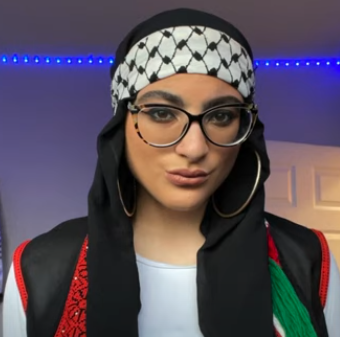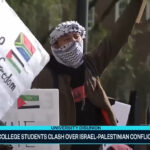The Ascent of the Crybully in Campus Anti-Israel Activism

As woke activists who are part of the cognitive war against Israel continue their campaign of slanders against the Jewish state, a curious thing has taken place: the self-righteous moral scolds who choose to relentlessly demonize Israel to promote Palestinian self-determination often portray themselves as victims rather than moral aggressors. They are examples of what has come to be defined as crybullies, individuals that British commentator Julie Burchill characterized as “a hideous hybrid of victim and victor, weeper and walloper . . . [someone who] always explains to the point of demanding that one agrees with them and always complains to the point of insisting that one is persecuting them.”
And nowhere is the crybully more likely to be found than among the pro-Palestinian activists who are relentless in their tactical assault on Israel and Zionism—and the people who support them—but who, once defenders of Israel answer back the calumnies and slurs lobbed by these activists, weaponize their status as victims and whine about the pushback they often, and justifiably, experience from their ideological opponents on campus.
One example of the appearance of crybullies occurred in 2017 at the annual meeting of the American Historical Association (AHA) where its faculty members issued a statement affirming “the rights of students, faculty and other historians to speak freely and to engage in nonviolent political action expressing diverse perspectives on historical or contemporary issues.” Putting aside the absurdly paranoid notion that any anti-Israel activism is suppressed or otherwise limited on campuses anywhere, what actually terrified these intellectual hypocrites, these crybullies, it seemed, was the possibility that, once they had publicly announced their enmity for Israel, Zionism, and Jewish affirmation, they would be held accountable for their toxic views, that they would be named for what they are: anti-Israel activists whose rabid ideology can, and should, be made transparent, exposed, and understood.
The AHA statement made this hypocrisy clear when it meretriciously stated that, “We condemn all efforts to intimidate those expressing their views. Specifically, we condemn in the strongest terms the creation, maintenance and dissemination of blacklists and watch lists —through media (social and otherwise)—which identify specific individuals in ways that could lead to harassment and intimidation.”
The so-called “blacklists” and “watch lists” referenced in the statement are such databases as Canary Mission (mentioned specifically), Discover the Networks, Campus Watch, the AMCHA Initiative, and other similar organizations, all of which have as their intention to provide students, faculty, and others with information on the ideology, scholarship, speeches, and writing of radical professors and students. These are individuals (and groups) who have very public records of pro-Palestinian, anti-Israel activism and whose words and behavior have been cataloged so that the politicization of scholarship can be exposed and students can avoid courses taught by professors with a predetermined and evident bias against Israel.
In gathering and cataloging this data, none of the mentioned organizations furtively investigated the private lives of professors or campus radicals, nor did they hack into emails accounts, or take testimony from anonymous sources, or delve through association memberships, reading habits, or private writings without the individuals’ expectation that their expression would possibly be documented. Individuals who are on these databases were not spied upon by their fellow students nor their courses videotaped furtively by students.
The findings—and this is the critical point that the crybully obviously ignores—were based on the public utterances, published works, and social media posts of professors and students, behavior and speech they apparently had no problem with making public and for which they were not hesitant, at least initially, to take responsibility.
Student activists have become crybullies, too. A particularly egregious case of this is currently unfolding at the University of Southern California, for example, involving the vile Yasmeen Mashayekh, a student in the USC Viterbi School of Engineering who a group of some 60 USC faculty has accused of “ongoing open expressions of anti-Semitism and Zionophobia.” What were some of the sentiments shared by the lovely Ms. Mashayekh, ironically, though possibly not coincidentally, a Diversity, Equity, and Inclusion senator in USC’s graduate student government? As cataloged on Canary Mission, on May 9, 2021, Mashayekh tweeted: “I want to kill every motherf**king zionist.” When Canary Mission responded to that odious tweet with one of their own, claiming that her tweet was “horrifying,” Mashayekh tweeted: “Oh no how horrifying that I want to kill my colonizer!!”
In June, Mashayekh tweeted: “Death to Israel and its b**ch the US.” And retweeted a tweet that read: “May i****l [Israel] burn to the ground. #SaveSilwan.” And in case there was any doubt about her feelings about the Jewish state, her June tweets included such tolerant and loving expressions as: “If you are not for the complete destruction of Israel and the occupation forces then you’re anti-Palestinian;” “Death to Israel;” and “Yes I f**king love hamas now stfu [shut the f**k up].”
Such ghoulish sentiments hardly qualify as being part of an intellectual debate about the Israeli/Palestinian conflict, nor by any measure can they be said to be “merely criticism of Israel,” as anti-Israel activists say in their own defense when they regularly try to hide the depths of their loathing of Israel, Zionism, and Jews—even wishing for the murder of Jews in Israel at the hands of terrorists.
But while the group of faculty called on the USC administration to take some proactive action to denounce the rhetoric and sentiment of one of its students, others who support Mashayekh have been busy transforming her from a hateful, anti-Semitic bigot into a victim of Islamophobia and racism, and someone even experiencing reputational damage. In fact, pro-Palestinians on campus drafted a form letter to Yannis Yortsos, Dean of the Viterbi School of Engineering, and USC’s President Carol Folt, with the subject line “In Support of Yasmeen Mashayekh: USC Must Act.”
Once Mashayekh’s tweets had been made public, there was understandable blowback and condemnation for her puerile and caustic comments, but to her supporters, those who shared similar attitudes about Israel, she was a victim, not a hateful perpetrator. The letter complained “about the targeted racial & ethnic harassment and abuse that Palestinian student Yasmeen Mashayekh has been subjected to in recent months by various established Zionist organizations,” as well as “continued and unrelenting digital racism that has resulted in academic penalization [and] emotional and psychological suffering — all because her identity as an exploited and oppressed person of Palestinian background is under attack.” [Emphasis added.]
And the caustic and repulsive language of her tweets? Because of her victim status as a Palestinian and “woman of color,” those tweets are not hateful at all, according to the letter’s authors, only a form of resistance to oppression and therefore perfectly acceptable. “Yasmeen’s statements referring to the ongoing Zionist colonial project,” the letter read, is only “the language of the oppressed towards their oppressor [and] is a form of personal resistance.” [Emphasis added.]
And in keeping with her status as a crybully, Mashayekh is actually “an oppressed student who is being unfairly discriminated against for speaking on her people’s plight.” The actual perpetrator here? Not Mashayekh, her fellow crybullies claim, but “Canary Mission, an organization that systematically reveals the personal & private information of Palestinians and Black, Indigenous People of Color in an effort to launch targeted harassment campaigns against those who would dare to challenge colonial rule.”
At McGill University, anti-Israel sentiment is so pervasive that the University’s student newspaper, the McGill Daily, refuses to run any content that is pro-Israel or defends Zionism or the Jewish state, and a recent editorial, apparently speaking on behalf of the whole student body, denounced Israel’s purported “colonialism, imperialism, and genocide in all forms” and claimed that the “Israeli occupation of Palestinian land is nothing short of apartheid.”
Given their success in poisoning the campus climate against Israel, one would think that the activist group McGill Students in Solidarity for Palestinian Human Rights (SPHR McGill) would feel victorious at having pushed their venomous ideology down the throats of their student peers. But last May, SPHR members began braying about a pernicious “blacklist [that] is terrorizing pro-Palestine students at McGill,” allegedly “compiled by a group of Zionist McGill students,” and containing “the names and personal information of countless pro-Palestine students at McGill” with the goal “to surveil and document students suspected of pro-Palestine sympathies.”
Without ever bothering to explain how, if at all, the existence of this mysterious blacklist negatively affects pro-Palestinian students, the crybullies almost hysterically claimed “that this list is not a passive, harmless document: it is being weaponized daily by Zionist students, who are employing racist, Islamophobic, anti-Arab, anti-Semitic, and anti-Black practices that put racialized students at risk.”
“By using this list and maintaining its secrecy,” the activists claimed, “these [Zionist students] have made themselves complicit in a vicious, racist campaign that attacks the fundamental right of racialized Palestinian and pro-Palestine students to exist at this university, without fear that they will be targeted in reprisal for signing petitions, sharing content on social media, or even expressing their views in private.” There has been a deliberate process by which Jews on campus are now accused of being white and enjoying white privilege, and especially if they are Zionists and are also then considered to be racists automatically, so the accusation about the Zionist-created blacklist having as its purpose to track and malign pro-Palestinian students of color is part and parcel of the trend to make the conflict between Israel and the Palestinians about race—thus, the ubiquitous allegations about Israeli apartheid, the “apartheid wall,” and the Zionism is racism” slur.
On the race-sensitive McGill campus, the activist crybullies unsurprisingly alleged that “The users of the list, most of whom appear to be white Zionist individuals or Zionist groups, are mainly targeting racialized students and replicating practices that emerge from a system of structural surveillance in North America, which seeks to criminalize Black, Brown and other racialized peoples” and puts “racialized people at risk.” [Emphasis added.] If such a list even exists, it is certainly not for the purpose of targeting and harassing students of color or students who happen to support the Palestinian cause. Its purpose is clearly not, as the paranoid SPHR members suggested, a process aimed at “recreating racist tropes that Black, Brown, and other racialized students are criminals whose identities, movements, thoughts, and opinions are worthy of being watched, surveilled, and harassed.”
Like the data collected from public expressions of radical faculty and students with a pronounced and vocal antipathy toward the Jewish state, the list’s information can be useful as a tool for assessing the background and ideological stance of the enemies of Israel, and someone finds his or her name on such a list, not because they are an Arab, or black, or some other minority, but because they have publicly articulated views that are slanderous, dangerous, threatening, genocidal, or revealing as anti-Semitic expression.
The activists discovered the list “to their horror” and were “incredibly disturbed” by its existence which was a “traumatic experience” that made them feel like they were “in grave danger.” But why would their words and ideas, written down in a file for anyone to refer back to, be more horrible or traumatic than the impact of these ideas when they were spoken or written or otherwise expressed in the first place, given that all of this speech was public? No normal person posts on social media with the expectation of privacy, which, after all, is the exact opposite of the purpose and result of using social media.
If these social justice bullies are willing and ready to spout forth their toxic narratives about their notion of Israel’s depraved and endlessly malign existence, they should expect, and be prepared for, a response and reckoning for their words and deeds—sometimes of equal or greater intellectual force. The crybully cannot expect to launch unrelenting ideological attacks on the supporters of Israel and not be answered back, confronted with counterarguments, and made to debate history and fact when propagating narratives and lies. If the crybully does not like being held accountable for his words or does not like being quoted for something he has said or written, then perhaps he should be silent. Otherwise, he should stand by his ideas and defend them without claiming that he is a victim of others’ ideology and belief.
The deepest feelings, poet Marianne Moore once observed, emerge “not in silence, but restraint.” There’s a lesson there for the crybully.




